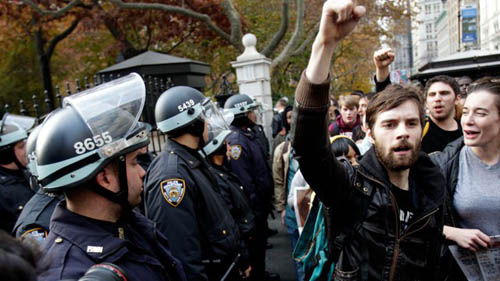
Police in riot gear watch as Occupy Wall Street protesters march past City Hall in New York, Nov. 15, 2011. (Seth Wenig/AP Photo)
November 17, 2011
On November 15, 2011, New York City Police evicted Occupy Wall Street (OWS) from lower Manhattan’s Zuccotti Park. Later that same day, OWS obtained a temporary restraining order (TRO) requiring that they immediately be allowed back into Zuccotti Park with their tents, tarps, and sleeping bags. But the next day, the New York County Supreme Court In the matter of Waller V. The City of New York, et. al. declined to extend the TRO. Thus, the OWS eviction stands, although OWS’s application challenging the eviction will continue.
It should be noted that the application was not only brought under New York State law, but also under the federal Civil Rights Act, 42 USC §§ 1983 and 1988.
On September 17, 2011, OWS began occupying Zuccotti Park on a 24-hour basis to bring attention to the growing disparity of wealth and power in the United States. Afterwards, OWS progeny sprung up in many cities across the nation and in a number of foreign cities.
Zuccotti Park, by the way, is a privately-owned park, established in 1968 pursuant to an agreement under which Brookfield Office Properties — the owner and one of the defendants — received development rights for adjacent properties in exchange for maintaining the park as a “public amenity.” Under the agreement, the park must be open to the public and maintained for public use 365 days per year.
Sometime after OWS occupied Zuccotti Park, Brookfield promulgated rules, prohibiting, among other things, camping and/or the erection of tents or other structures; lying down on the ground, or lying down on benches; the placement of tarps or sleeping bags or other covering on the property; and storage or placement of personal property on the ground, benches, sitting areas or walkways which unreasonably interferes with the use of such areas by others. These rules were clearly aimed at OWS.
At the court hearing, Brookfield represented that after Zuccotti Park is cleaned and restored, OWS will be permitted to reenter the park and resume using it, in conformity with the law and the owner’s rules.
The parties disputed whether the First Amendment applied to a privately-owned park even though it was maintained as a public amenity. For purposes of OWS’s application for an extension of the TRO, the court ruled that the First Amendment did apply, but the owner of the park had the “right to adopt reasonable rules to permit it to maintain a clean, safe, publicly accessible space consonant with the responsibility it assumed to provide public access according to law.” The court further ruled that OWS did not demonstrate that the rules were “not reasonable time, place, and manner restrictions permitted under the First Amendment.”
Finally, the court noted that New York City prohibits the erection of structures, the use of gas or other combustible materials, and the accumulation of garbage and human waste in public places. Thus, according to the court, Brookfield’s rules appeared to be reasonable to maintain the space in a hygienic, safe, and lawful condition, and to prevent it from being liable for violations of New York City laws.
What next? The case is not over. The parties must submit all briefs to the court by December 1st. I assume a final court decision will follow shortly thereafter. However, the court has already signaled that, although the First Amendment applies, Brookfield’s rules are reasonable, and furthermore, the occupation probably violates a number of New York City laws. Therefore, I predict that the OWS eviction from Zuccotti Park will stand. Should OWS set up camp in another public location, the expected court ruling will probably justify an eviction from that new location.
Although any court ruling upholding the eviction of OWS is applicable only to New York state, the ruling will probably prove influential in other possible court actions involving similar occupations in other U.S. cities.
What are OWS’s options in light of the expected adverse court action? OWS can appeal the lower court’s ruling. It can defy the court’s ruling and force a series of confrontations with the authorities. Or it can continue to protest and demonstrate in accordance with Brookfield’s rules and the laws of New York City.
OWS may lose the court case but hopefully they have not lost the spirit and determination of the movement.


 The Hunger Site
The Hunger Site
No Comments
Comments for What Next for Occupy Wall Street
Following Adverse Court Ruling? are now closed.